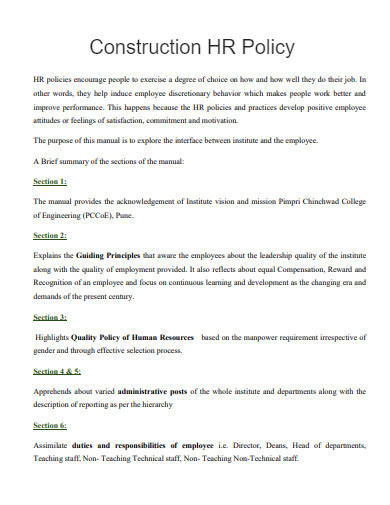Steering the pillars of the construction industry isn’t just about bricks and beams; it’s about people. The Construction HR Policy lays the foundation for cultivating a robust workforce, ensuring safety, promoting skill development, and fostering harmonious team dynamics. Dive into these pivotal guidelines designed to elevate both the craft and the craftsmen, making sure every project not only stands tall but stands on a bedrock of best HR practices.
10+ Construction HR Policy Samples
1. Policy Template Bundle
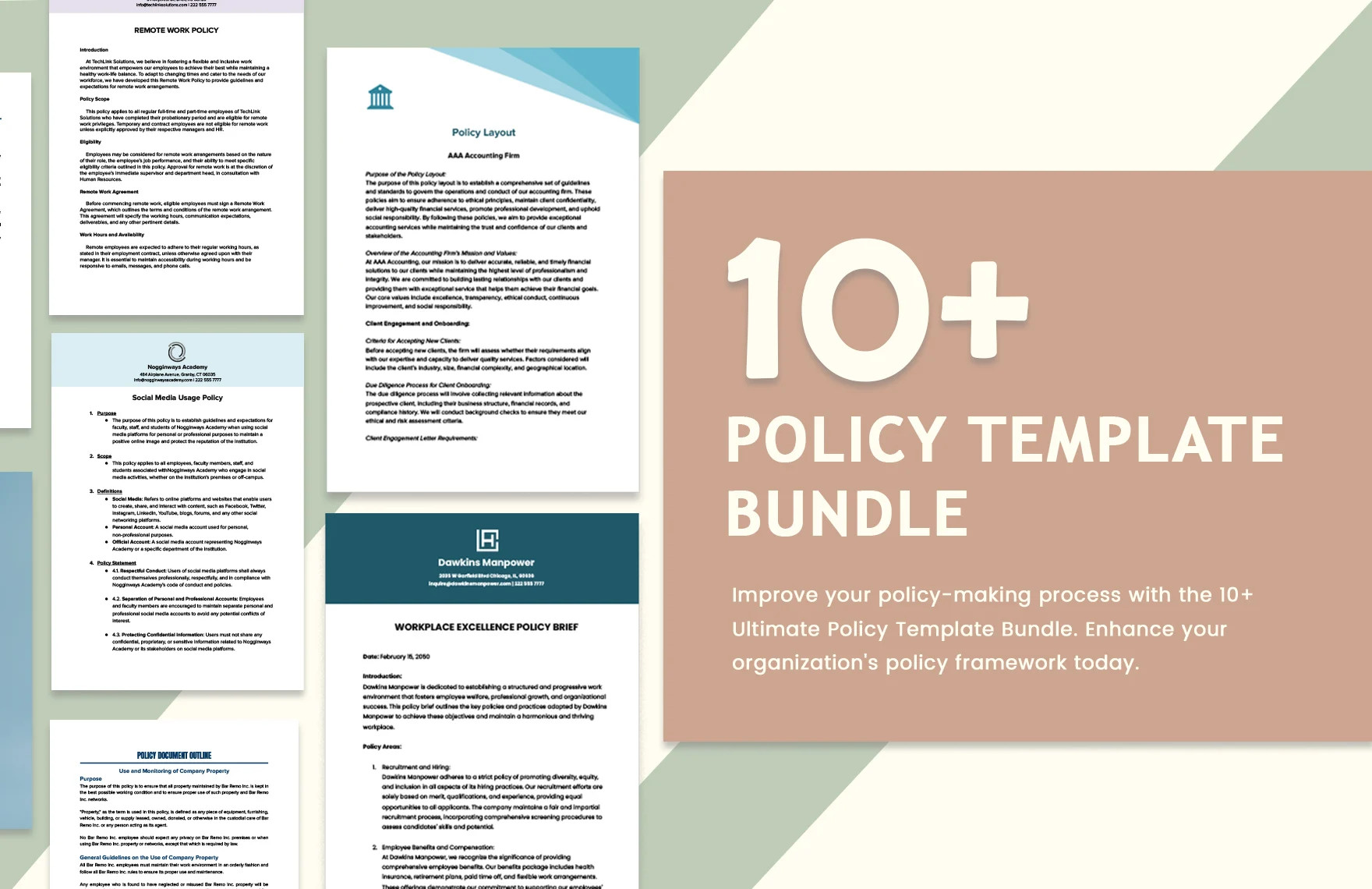
2. Sample Construction HR Policy Template Bundle
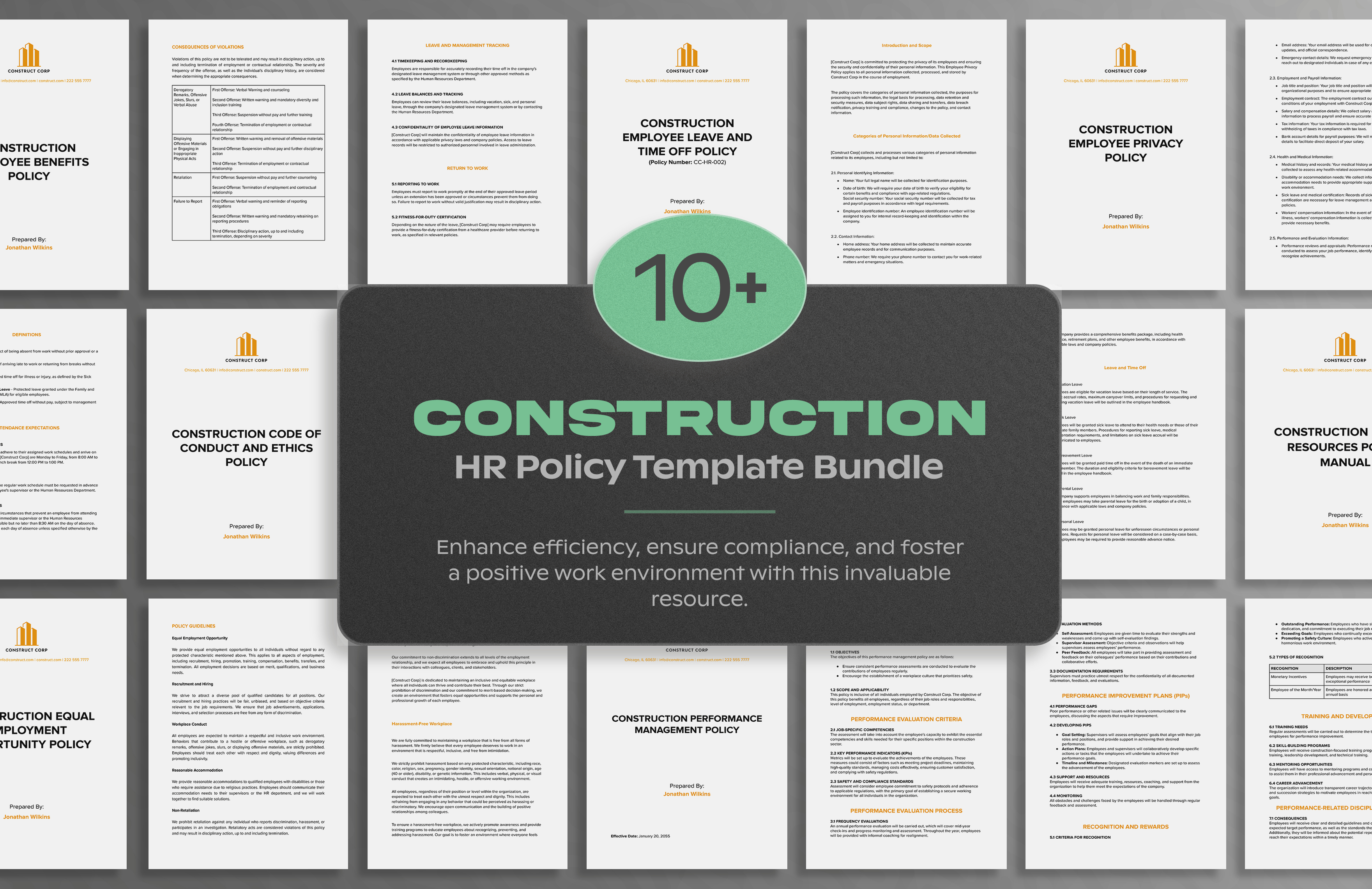
3. Construction HR Policy Template
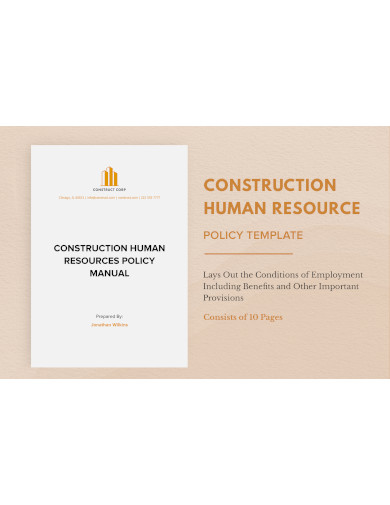
4. Construction Equal Employment Opportunity Policy Template
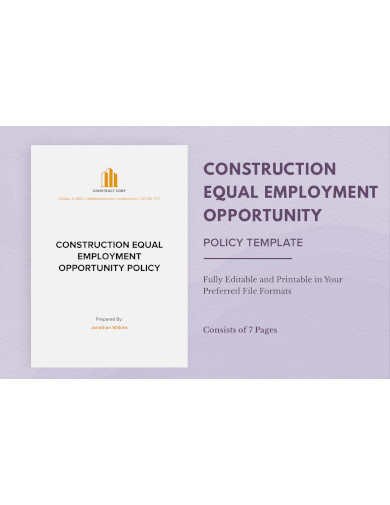
5. Construction Anti-Discrimination Policy Template
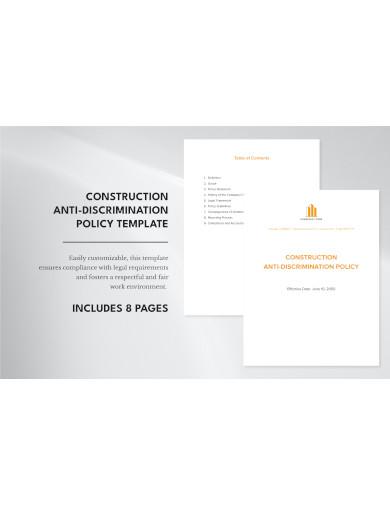
What is an example of a HR policy?
Understanding HR Policies
At its core, an HR policy is a formal statement of a principle or rule that members of an organization must follow. These policies act as a guiding compass, directing the behavior of individuals in various scenarios, ensuring fairness, transparency, and consistency in the management of personnel.
Anatomy of a Typical HR Policy
A comprehensive HR policy usually includes:
- Purpose: Outlining the main objective of the policy.
- Scope: Defining who the policy applies to, often encompassing all employees.
- Procedure: A step-by-step guide detailing how the policy is to be implemented.
- Roles and Responsibilities: Specifying who is responsible for executing each part of the policy.
- Review Period: Indicating when the policy will be reviewed next to ensure it remains relevant.
Example: Remote Work Policy
With the rise of digital communication tools, remote work has become a staple in many organizations. Here’s a brief example of a remote work HR policy:
- Purpose: To provide employees with the guidelines required to work from home or another remote location effectively.
- Scope: All full-time employees who have completed their probation period.
Procedure:
- Employees wishing to work remotely must send a written request to their supervisor.
- The IT department will ensure that remote workers have secure access to company networks.
- Regular check-ins will be scheduled to monitor progress and address any concerns.
Roles and Responsibilities:
- HR to provide training resources on effective remote working.
- IT department to ensure all equipment is functional and secure.
- Employees to ensure they have a conducive working environment at home.
Review Period: This policy will be reviewed annually.
Importance of Clear HR Policies
Clear HR policies eliminate ambiguity and potential conflicts. They ensure that everyone, from the leadership to the newest recruit, understands the expectations and procedures, allowing organizations to run smoothly.
What is the role of HR in construction?
The Unique Nature of the Construction Industry
The construction sector is rife with unique challenges: fluctuating workforce demands, stringent safety protocols, project-based timelines, and diverse skill sets. Within this dynamic environment, Human Resources plays a pivotal role.
Recruitment and Training
The foundation of any successful construction project is its workforce. HR is responsible for:
- Sourcing skilled labor and professionals.
- Ensuring adequate training, especially concerning safety protocols and machinery usage.
- Retaining top talent through competitive compensation and benefits.
Safety and Compliance
In an industry where safety is paramount, HR ensures:
- Regular safety training sessions are conducted.
- Compliance with all local and federal safety regulations.
- Effective communication of safety standards to all employees.
Labor Relations and Conflict Resolution
Given the diverse teams in construction, conflicts are inevitable. HR’s role here is:
- Mediating disputes between workers, subcontractors, and management.
- Ensuring clear communication channels.
- Crafting policies that promote harmony and inclusivity.
Performance Management
Construction projects are deadline-driven. HR ensures:
- Regular performance reviews to identify and address any issues.
- Recognition and rewards for outstanding work.
- Constructive feedback mechanisms to help employees improve.
Employee Welfare and Benefits
Construction jobs can be physically demanding. HR’s responsibilities include:
- Implementing health and wellness programs.
- Ensuring all workers have the necessary insurance and benefits.
- Providing avenues for employees to discuss personal or professional concerns.
The Bigger Picture
HR in construction is not just about hiring and firing. It’s about building a strong, cohesive team that can work efficiently and safely, no matter the challenges they face. From onboarding to retirement, HR stands as a pillar supporting each employee, ensuring the entire structure of the organization remains sound.
6. Construction Employee Privacy Policy Template
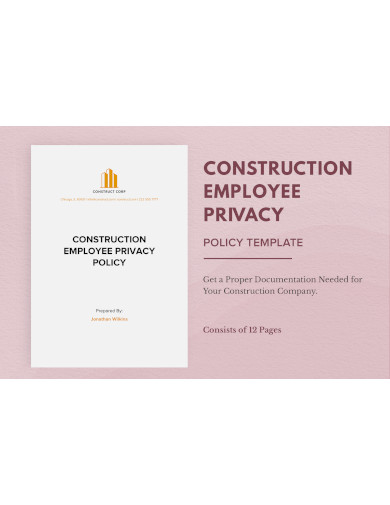
7. Construction Employee Benefits Policy Template
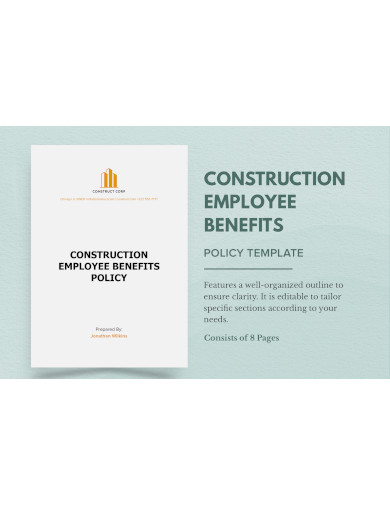
8. Construction Employee Leave and Time Off Policy Template
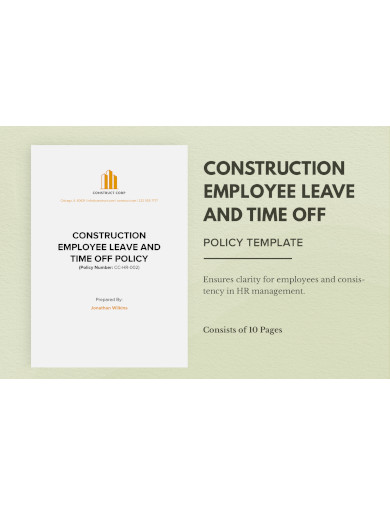
9. Construction Code of Conduct and Ethics Policy Template
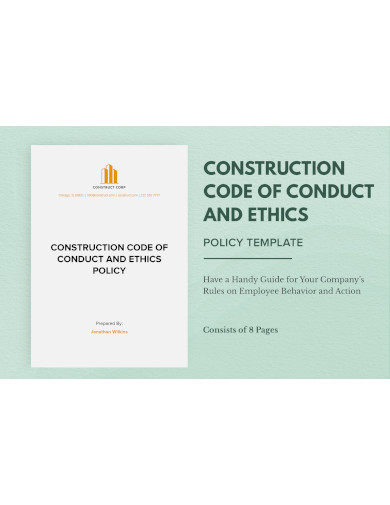
10. Construction Harassment and Sexual Harassment Policy Template
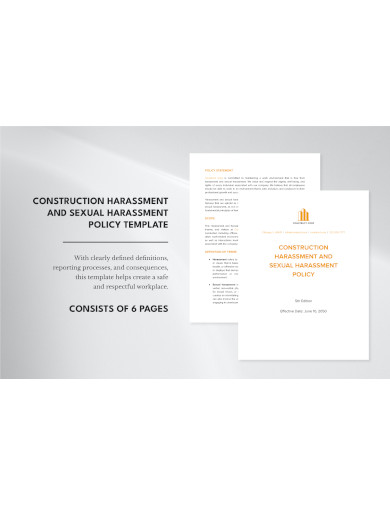
11. Printable Construction HR Policy Template
How do you write HR policy and procedures?
The Foundations of Policy Creation
Creating effective HR policies and procedures is crucial for any organization. These guidelines not only establish a consistent approach to managing personnel but also provide clarity and fairness. Here’s how to craft them effectively:
Research and Analysis
Before penning down any policy, it’s essential to:
- Understand legal requirements related to employment in your jurisdiction.
- Analyze industry best practices.
- Gather feedback from employees and managers about current challenges.
Define Clear Objectives
Every policy must have a clear purpose. Whether it’s to address a specific challenge, comply with a legal mandate, or improve current practices, understanding this purpose will guide the content of the policy.
Draft the Policy
With a clear objective in mind:
- Begin with a brief introduction or purpose statement.
- Clearly state to whom the policy applies.
- Use simple language, avoiding jargon and overly complex sentences.
Detail the Procedures
Procedures provide a step-by-step guide on how to implement the policy. Ensure:
- Each step is detailed clearly.
- There’s a logical flow from one step to the next.
- Any required resources, like forms or tools, are mentioned.
Assign Roles and Responsibilities
Every policy requires actions. Clearly state:
- Who is responsible for what.
- How often tasks need to be completed.
- Who holds accountability in case of discrepancies.
Review and Revise
Before finalizing:
- Have the draft reviewed by stakeholders, including legal counsel, managers, and select employees.
- Make necessary revisions based on feedback.
Communicate and Train
Once the policy is finalized:
- Disseminate it to all employees.
- Provide necessary training or informational sessions.
- Ensure there’s a platform for employees to ask questions or seek clarifications.
Regularly Update
The business landscape changes, and policies should too. Regularly review and update policies to ensure they remain relevant and effective.
What should be included in a human resource policy?
The Building Blocks of HR Policy
Human Resource policies provide a framework for managing and supporting employees. While the specifics might vary based on the organization’s size, industry, and culture, certain fundamental elements should be present in every HR policy:
Introduction and Purpose
Every HR policy should begin with:
- A brief introduction about the policy’s background.
- A clear statement about its purpose and the problem it aims to address.
Scope of Application
This section should define:
- Who the policy applies to (e.g., full-time employees, part-time staff, contractors).
- Any exceptions or special considerations.
Policy Statement
The core of the document, this section:
- Details the policy in clear, concise terms.
- May contain sub-sections if the policy covers various areas.
Roles and Responsibilities
This segment specifies:
- The roles of various personnel in implementing the policy.
- The hierarchy of responsibility.
- Duties of each role.
Procedures
While the policy states the “what,” procedures detail the “how.” This part:
- Provides a step-by-step guide on implementing the policy.
- Clarifies any tools or resources required.
- Outlines the flow of actions and decisions.
Review and Update Mechanism
To ensure the policy stays relevant:
- Specify when it will be reviewed.
- State who will be responsible for this review.
- Detail the process of updating and communicating changes.
Grievance Redressal
Policies can sometimes lead to disputes or misunderstandings. Hence, always include:
- A clear process for employees to raise concerns.
- Steps for addressing and resolving those concerns.
- Additional Resources or Appendices
If relevant:
- Add forms, templates, or tools related to the policy.
- Provide a glossary for any technical terms.
Consequences of Non-Compliance
For policies to be effective, they need to be enforced. Clearly state:
- What happens if the policy is not adhered to.
- Potential repercussions, both for individuals and the organization.
Signature and Approval
Most official policies will end with:
A place for top management or HR leadership to sign, showcasing their endorsement and commitment.
Date of approval or last revision.
With these elements, an HR policy becomes a holistic guide that can effectively support both employees and the organization’s broader objectives.
Related Posts
FREE 10+ Related Personnel Policy Samples in MS Word | PDF
FREE 10+ Suspension And Expulsion Policy Samples in MS Word | PDF
FREE 10+ Uniform Complaint Policy and Procedure Samples in PDF
FREE 10+ Bullying Policy Samples in MS Word | PDF
FREE 10+ Fiscal Control Policy Samples & Templates in MS Word | PDF
FREE 10+ Cooperative Policy Samples & Templates in MS Word | PDF
FREE 10+ Disenrollment Policy Samples in MS Word | PDF
FREE 10+ Donation Policy Samples & Templates in MS Word | PDF
FREE 10+ Homework Policy Samples & Templates in MS Word | Pages | PDF
FREE 10+ IT and Software Policy Samples in PDF | MS Word | Pages | Google Docs
FREE 50+ Policy Samples in PDF | MS Word
FREE 50+ Membership Policy Samples in PDF
FREE 10+ Shipping Policy Samples in PDF
FREE 10+ Expense Policy Samples in Word | Google Docs | Pages | PDF
FREE 10+ Website Policy Samples in PDF | MS Word | Pages | Google Docs | Outlook

